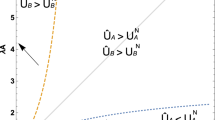Abstract
The European Union has long maintained an intention to move to the origin principle of taxation, but no progress has been made since the completion of the single market. The lack of progress seems surprising, given the significant support for the origin principle in the economic literature. However, there is a contrast between the European Union that contains countries of widely different sizes and productivity levels, and the theoretical literature that has focused on models with symmetrical countries. We extend the modelling of preferences over tax principles to incorporate asymmetries in efficiency and size. We show that asymmetry can cause disagreement among countries over tax principles to be sustained even with close economic integration. Large countries and inefficient countries are shown to prefer the origin principle. In contrast, small countries and efficient countries can have a preference for the destination principle. These results provide an insight into the political economy of the impasse in European Union tax policy.
Similar content being viewed by others
References
Brander, J. A., & Spencer, B. (1985). Export subsidies and international market share rivalry. Journal of International Economics, 18, 83–100.
Guesnerie, R., & Laffont, J.-J. (1978). Taxing price makers. Journal of Economic Theory, 19, 423–455.
Hashimzade, H., Khodavaisi, H., & Myles, G. D. (2005). Tax principles, product differentiation and the nature of competition. International Tax and Public Finance, 12, 695–712.
Haufler, A., & Pfluger, M. (2004). Commodity taxation under monopolistic competition. Journal of Public Economic Theory, 6, 445–470.
Haufler, A., Schjelderup, G., & Stahler, F. (2005). Barriers to trade and imperfect competition: the choice of commodity tax base. International Tax and Public Finance, 12, 281–300.
Keen, M., & Lahiri, S. (1998). The comparison between destination and origin principles under imperfect competition. Journal of International Economics, 45, 323–350.
Lockwood, B., de Meza, D., & Myles, G. D. (1994a). When are origin and destination regimes equivalent? International Tax and Public Finance, 1, 5–24.
Lockwood, B., de Meza, D., & Myles, G. D. (1994b). The equivalence between destination and non-reciprocal restricted origin tax regimes. Scandinavian Journal of Economics, 96, 311–328.
Tinbergen Committee (1953). Report on the Problems Raised by Value Added Taxation in the Common Market.
Vives, X. (1984). Duopoly information equilibrium: Cournot and Bertrand. Journal of Economic Theory, 34, 71–94.
Author information
Authors and Affiliations
Corresponding author
Rights and permissions
About this article
Cite this article
Hashimzade, N., Khodavaisi, H. & Myles, G.D. Country characteristics and preferences over tax principles. Int Tax Public Finance 18, 214–232 (2011). https://doi.org/10.1007/s10797-010-9151-y
Published:
Issue Date:
DOI: https://doi.org/10.1007/s10797-010-9151-y




